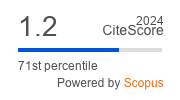Preschoolers’ Listening Comprehension Development in Conjunction with Their Cognitive Development: A Meta-Analysis
Keywords:
listening, speech activity, speech perception, speech understanding, meaning, sense.Abstract
This article presents a meta-analysis of previous research involving the preschoolers’ listening comprehension development viewed in conjunction with their cognitive development. The meta-analysis involves research findings in the field of psycholinguistics published in Eastern Europe and in the former Soviet Union between 1940s and 2010s. The findings of the meta-analysis indicate that listening comprehension is regarded as a complex form of speech activity, which involves i) auditory perception of the language codes and forms (lexical and grammatical structures – words, phrases, sentences, statements); ii) recognition and storage of the aforementioned language codes in short-term and long-term memory respectively; iii) comprehension of the verbal message in the internal speech, which is subsequently decoded in deep mental representations. The results of the meta-analysis suggest that there is a complex interrelation between the preschoolers’ listening comprehension and their cognitive development.
References
- Blonskiy, P. (2001). Pamjat i Myshlenie [Memory and Thinking]. S.-Petersburg: Piter.
- Caparulo, B. & Cohen, D. (1983). Developmental language studies in the
neuropsychiatric disorders of childhood. Children’s language, 4. - Galperin, I. (1981). Tekst kak Obyekt Lingvisticheskogo Issledovaniya [Text as an
Object of Linguistic Study]. Moscow: Nauka. - Dickinson, D., & Smith, M. (1994). Long-term effects of preschool teachers’ book
readings on low-income children’s vocabulary and story comprehension. Reading Research
Quarterly, 105–122. - Harchenko, N. (2013). Uchim doshkolnikov ponimaniyu ustnyih razvernutyih
vyiskazyivaniy [Teaching the preschoolers to understand oral expanded utterances].
Innovatsionnaya deyatelnost v doshkolnykh obrazovatelnyh uchrezhdeniyah: Materialy
VI Mezhdunarodnoy nauchno-prakticheskoy konferentsii (488–495). Yaroslavl-Moscow: Kantsler. - Istomina, Z. (1967). Vozrastnyie i Individualnyie Razlichiya v Sootnoshenii Raznyh
Vidov i Storon Pamyati v Doshkolnom Vozraste [Age and Individual Differences in Correlation of
Different Types and Kinds of Memory in a Preschool Age]. Moscow: Pedagogika - Kalmykova, L. (2011). Psyhologiya rozvytku movlennevoi diyalnosti ditey doshkilnogo
viku [Psychology of speech activities of preschool age children]. Unpublished Ph.D. thesis. Kyiv. - Karpinskaya, N. (1972). Hudozhestvennoe Slovo v Vospitanii Detey [Literary Word in
Upbringing of Children]. Moscow: Pedagogika. - Klychnikova, Z. (1983). Psihologicheskie Osobennosti Obucheniya Chteniyu na
Inostrannom Yazyike [Psychological Peculiarities in Teaching Foreign Language Reading].
Moscow: Prosveschenie. - Kooijman, V., Hagoort, P., & Cutler, A. (2005). Electrophysiological evidence for
prelinguistic infants’ word recognition in continuous speech. Cognitive Brain Research, 24(1),
109–116. - Kostyuk, G. (1988). O Psihologii Ponimaniya [On Psychology of Understanding].
Izbrannyie psihologicheskie trudy. Moscow: Pedagogika. - Lyublinskaya, A. (1972). Vospitatelyu o Razvitii Rebyonka [To Educator on
Development of a Child]. Moscow: Prosveschenie. - Lyublinskaya, A.A. (1965). Ocherki Psihicheskogo Razvitiya Rebyonka [Essays on
Psychic Development of a Child]. Moscow: Prosveschenie. - Morozova, N. (1947). O ponimanii teksta [On understanding of text]. Izvestiya APN
RSFSR, 7, 191–240. - Pezzulo, G., & Castelfranchi, C. (2009). Intentional action: from anticipation to goaldirected behavior. Psychological Research PRPF, 73(4), 437–440.
- Rost, M., & Candlin, C. N. (2014). Listening in Language Learning. Routledge.
- Rubinshteyn, S. (1958). O myishlenii i Putyah Yego Issledovaniya [On Thinking and
Ways of Its Investigation]. Moscow: AN SSSR. - Rumyantseva, I. (2004). Psihologiya Rechi i Lingvopedagogicheskaya Psihologiya
[Psychology of Speech and Linguopedagogical Psychology]. Moscow: PERSE; Logos. - Rubinshteyn, S. (1989). Osnovyi Obschey Psihologii [Fundamentals of general
psychology]. Moscow: Pedagogika. - Teplov, B. (1947). Psihologicheskie voprosyi hudozhestvennogo vospitaniya
[Psychological problems of artistic upbringing]. Izvestiya APN RSFSR, 11. - Ushakova, N., Pavlova, I., Zachesova, M. (1989). Rech Cheloveka v Obschenii [Human
Speech in Communication]. Moscow: Nauka. - Vygotsky, L. (2011), Myshlenie i Rech [Thinking and Speech]. Moscow: AST: Astrel.
- Welsh, J., Nix, R., Blair, C., Bierman, K., & Nelson, K. (2010). The development of
cognitive skills and gains in academic school readiness for children from low-income families.
Journal of educational psychology, 102(1), 43. - Zalevskaya, A.A. (2005). Psiholingvisticheskie Issledovaniya. Slovo. Tekst.
[Psycholinguistic Researches. Word. Text]. Moscow: Gnozis. - Zimniaya, I.A. (1976). Smyislovoe vospriyatie rechevogo soobscheniya [Semantic
perception of a vocal message]. Smyislovoe Vospriyatie Rechevogo Soobscheniya, 5, 33.







 Creative Commons «Attribution» 4.0
Creative Commons «Attribution» 4.0